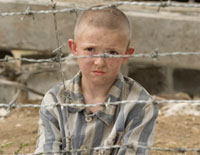 The New York Times movie critic A.O. Scott counts no fewer than five Holocaust movies coming out this holiday season–speculating that it’s the end of the year Oscar hopefulness that has sparked this spate of films capturing the horrors of the Holocaust. The five include:
The New York Times movie critic A.O. Scott counts no fewer than five Holocaust movies coming out this holiday season–speculating that it’s the end of the year Oscar hopefulness that has sparked this spate of films capturing the horrors of the Holocaust. The five include:
1. The Boy in the Striped Pajamas (David Thewlis)
2. Adam Resurrected (Jeff Goldblum)
3. The Reader (Kate Winslet)
4. Valkyrie (Tom Cruise)
5. Defiance (Daniel Craig)
“The near-simultaneous appearance of all these movies is to some degree a coincidence, but it throws into relief the curious fact that early 21st-century culture, in Europe and America, on screen and in books, is intensely, perhaps morbidly preoccupied with the great political trauma of the mid-20th century,” writes Scott. “The number of Holocaust-related memoirs, novels, documentaries and feature films in the past decade or so seems to defy quantification, and their proliferation raises some uncomfortable questions. Why are there so many? Why now? And more queasily, could there be too many?”
Good questions. And the trend can’t only have to do with Oscar season, can it? Scott speculates:
“The moral imperatives imposed by the slaughter of European Jews are Never Again and Never Forget, which mean, logically, that the story of the Holocaust must be repeated again and again. But the sheer scale of the atrocity — the six million extinguished lives and the millions more that were indelibly scarred, damaged and disrupted — suggests that the research, documentation and imaginative reconstruction, the building of memorials and museums, the writing of books and scripts, no matter how scrupulous and exhaustive, will necessarily be partial, inadequate and belated. And this tragic foreknowledge of insufficiency, which might be inhibiting, turns out, on the contrary, to spur the creation of more and more material.”
But profiting from tragedy and horror, turning the Holocaust into something called art brings additional, and even grotesque complications with it, too:
“To describe these [artworks] as masterpieces is not especially controversial, but it is also, as Adorno perhaps anticipated, somehow unseemly. If the Holocaust can inspire a great work of art, then it can also incubate the ambition to achieve such greatness, and thus open itself up, like everything else, to exploitation, pretense and vulgarity. Worse, the aura that still surrounds this topic — the sense that it must be treated with a special measure of tact and awe — can be appropriated by clumsy, sentimental and meretricious films or books, which protect themselves from criticism by a cloak of seriousness and piety. Thus the immodest indecency of a movie like Roberto Benigni’s Oscar-winning “Life Is Beautiful” was, during its initial period of triumph, deflected onto those with the temerity to criticize it. Those who resisted its manipulative juxtaposition of sweet, childlike innocence with barbarity were accused of lacking the gravity and sensitivity that Mr. Benigni’s travesty required.”
What do you think of this trend of Holocaust films this season? Are these movies a kind of moral imperative in themselves–are they necessary creations? Or are they somehow “unseemly,” playing on sentiment and profiting off of unimaginable tragedy? Will you be going to see all these films over the holidays?


